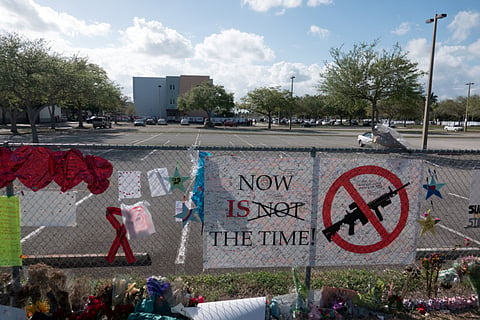Irrational attachment to guns must end
In classical westerns, the true American hero is the freedom-loving, rugged gunslinger, who knows right from wrong in his gut

Defending the right of United States citizens to buy semi-automatic rifles or carry concealed weapons is akin to denying any human responsibility for climate change. Rational arguments are not the point. No matter how many schoolchildren are gunned down or what the scientific evidence may be for the effects of carbon dioxide emissions, people will not change beliefs that define their identity.
Collective identities have a history, of course. The US Constitution’s Second Amendment, which guarantees the right to keep and bear arms, was adopted in 1791, when citizens who had rebelled against the British monarchy thought they needed to protect themselves, if called upon, against an oppressive state. Interpretation of this amendment has been contested terrain, but the original idea was that citizen militias should be armed. For many Americans, especially in rural areas and in the southern states, this collective entitlement became akin to a God-given individual right. Demagogues have had great success pitting such people against coastal and urban elites who supposedly want to strip them of this right.
But if this is the core of many Americans’ identity, it points to an odd contradiction in their national self-image. The Second Amendment is of course a legal concept. In a way, that is true of the US itself. As a country of immigrants, the US is not based on shared ancestry or culture. It is based on laws — the only way a people from so many different cultural backgrounds could be bound together in a common enterprise. No wonder, then, that there are so many lawyers in the US, and why Americans are more litigious than, say, the Japanese, who rely more on customs and traditions. If the US can be said to have a civic religion, the Constitution is its holy writ. And that is precisely how conservatives treat the foundational laws, including the Second Amendment. At the same time, however, many Americans cherish national myths, no less foundational in their way, which are in direct opposition to the idea of a nation of laws. In classical westerns, the true American hero is the rugged gunslinger, who knows right from wrong in his gut, the freedom-loving rambler who rides into the sunset on his trusted horse, a rifle slung across his shoulders. John Wayne arrives to save the citizens from the bad guys in black suits whose nefarious deeds undermine the liberty of the American frontier.
Rural idyll
But who are those villains dressed in black? They are bankers, lawyers, businessmen, and railroad builders, often representing the interests of powerful figures in the big cities on the East Coast. They employ fighting men of their own, to be sure, but the black-suited men come from a world of contracts, treaties, and big government. The story of most westerns is of a wide-open rural idyll, where man has found perfect autonomy, threatened by a state ruled by man-made laws. The only laws the western hero respects are those laid down by his own conscience. And he badly needs his gun to defend them.
The problem with the American myth is that this rural idyll of perfect individual liberty, this state of nature, as it were, cannot possibly be maintained in a highly organised state of banks, courts, business corporations, and legislatures. The Second Amendment is a sop to the myth, disguised by the fact that it is also encoded as law. Ronald Reagan understood the mythical yearning of many Americans better than most presidents, perhaps because he had acted in a number of westerns himself. When he famously proclaimed that “US government is not the solution to our problem, it is our problem,” he was talking like a gunslinger, even though he was officially speaking as the newly installed US president. In a far coarser and more belligerent way, Donald Trump has followed Reagan’s example. In fact, he really is a kind of outlaw, with no use for norms of civility in government. In many ways, Trump has managed to combine the habits of a desperado with the interests of the men dressed in black suits, the corporate leaders, the bankers, and their political representatives in Washington.
Trump is a New York hustler who can tap into the fears of Bible belt gun-lovers. If the US is riven by an escalating culture war over its national identity, Trump has the uncanny ability of personifying aspects of both sides of the divide: the lawlessness of the gunslinger and the rapaciousness of the city slicker.
America must overcome the dangerous fissures that are tearing its society apart, and bridge the cultural divide.
— Project Syndicate
Ian Buruma, Editor of The New York Review of Books, is the author of Year Zero: A History of 1945.


